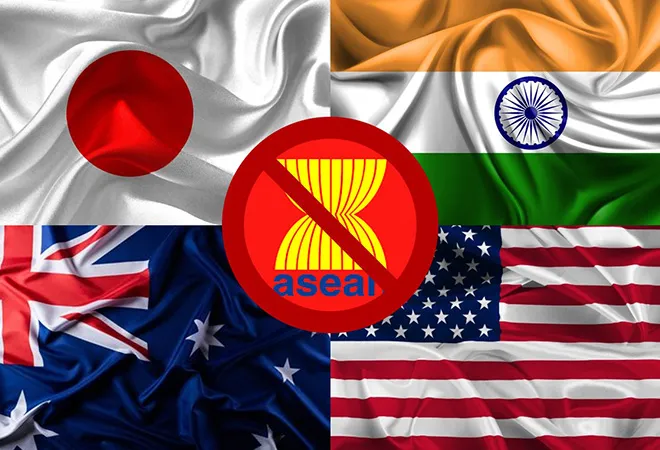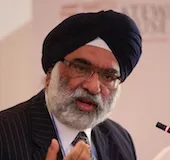-
CENTRES
Progammes & Centres
Location
ASEAN could have closer cooperative ties with QUAD as long as there is no strategic dimension to it

The prospect of the Association of South East Asian Nations (ASEAN) becoming more open to working with the Quad—a strategic security dialogue between Australia, India, Japan, and the United States (US)—and the AUKUS—a trilateral security pact between Australia, the United Kingdom, and the US—in functional terms is now emerging. While there have been suggestions on this from academia, most government sources in the ASEAN countries tend to downplay this.
However, in a recent interview with the New Straits Times, Indonesian President Jokowi, the ASEAN Chair for 2023, was asked whether ASEAN centrality in the Indo-Pacific region was causing anxiety, particularly since the emergence of the Quad and the AUKUS which were not ASEAN-centric regional security arrangements. How would Indonesia as the ASEAN Chair ensure its relevance in this context? In a significant response, Jokowi said, “ASEAN is the only regional organisation that offers various forms of diplomacy. ASEAN's principle is collaboration, cooperation and active involvement. We do not want any conflict. We do not want isolation …we should view the Quad and AUKUS as partners, and not competitors.”
There was a holding operation by Indonesian representatives who, however, did not deny the possibility of enhancement under Indonesia's chairmanship with the Quad and AUKUS.
Hereafter, there was a holding operation by Indonesian representatives who, however, did not deny the possibility of enhancement under Indonesia's chairmanship with the Quad and AUKUS. The Indonesian Permanent Representative to ASEAN Ambassador Derry Aman responded at the Foreign Policy Community of Indonesia (FPCI) Foreign Policy Forum on 15 May.
ASEAN remained open to cooperating with its dialogue partners which comprise the membership of both the Quad and the AUKUS. There was no formal engagement between ASEAN and these entities. Jokowi’s response reflected ASEAN openness, rather than a fulsome engagement with the Quad and the AUKUS since this did not feature in the Chairman’s statement of the 42nd ASEAN summit. Could it, however, emerge at the 43rd ASEAN summit to be chaired by Indonesia in September 2023?
Rizal Sukma, Jokowi’s early foreign policy adviser, said at the same conference that issues like nuclear submarines are not areas where ASEAN can cooperate with AUKUS, but aspects relating to emerging technologies were of mutual interest. He attributed Jokowi’s response to this light. With regard to the Quad, ASEAN could very well cooperate with it in several areas including disaster management and dealing with the pandemic.
Undoubtedly, since Quad 2.0 went into summit mode, it shed its military logic. Its communiques and focus are on functional cooperation with an eye to the future. Geographically, it focused on the Indo-Pacific with great intent and with each summit, the praise for ASEAN’s aspirations for centrality and unity are emphatically subscribed to. It would seem odd that the Quad, which emerged to counter China since ASEAN was unable to do so, is reaching out to ASEAN with deference, as a battle of hearts and minds in the region is joined.
There is an appreciation that India has played a role in softening how the Quad manifested the outreach in non-military terms to ASEAN and the South Pacific. At a recent symposium in Singapore, hosted by the S. Rajaratnam School of International Studies (RSIS), the Chinese representative Retired Col Zhou Bo spoke on how the AUKUS is anti-Chinese and the Quad is not. He said that China does not see the Quad as provoking China. This change is mainly because of the role India has played in giving the Quad a direction, which is non-military and cooperative, he added.
It would seem odd that the Quad, which emerged to counter China since ASEAN was unable to do so, is reaching out to ASEAN with deference, as a battle of hearts and minds in the region is joined.
Academic circles in Singapore emphasised its significance and Indian participants at that occasion confirmed that this was said, perhaps in a wider context. Does this mean that the Quad and ASEAN can move towards a more meaningful partnership since Chinese objections are diminishing? This is what the Quad has sought over the last two years to engage ASEAN in a non-military, meaningful manner. This is what Jokowi seems to be acknowledging.
ASEAN is uncomfortable with big power rivalry, and initially saw the Quad and AUKUS as challenges to China, seeking ASEAN to lean to one side. The evolution of the Quad and the participation of six ASEAN countries in negotiations under the Indo-Pacific Economic Framework (IPEF), which was launched at a the Quad summit, indicates that as part of their strategic autonomy, they are ready to engage with their partners which is advantageous.
Despite anxieties that the Quad could undermine ASEAN centrality, 50.4 percent of ASEAN respondents in the State of SE Asia Survey 2023, agree that the strengthening of the Quad will be helpful. This view has the most support from Brunei, Indonesia, Malaysia, Myanmar, the Philippines, Singapore, Thailand, and Vietnam. Barely 12.2 percent of respondents disagreed, a marginal decrease from 13.1 percent in 2022. Among those, Singapore, (19.7 percent), Thailand (15.3 percent) and Indonesia (14.9 percent) are the most pessimistic. The number of neutral respondents increased from 28.5 percent to 37.4 percent, mainly from Cambodia (67.2 percent) and Laos (60.7 percent).
Despite anxieties that the Quad could undermine ASEAN centrality, 50.4 percent of ASEAN respondents in the State of SE Asia Survey 2023, agree that the strengthening of the Quad will be helpful.
It is simplistic to infer that ASEAN prefers China as an economic partner, yet is ready to participate in the IPEF; it wants to avoid strategic choices but is ready to engage with the Quad. These are half-perceptions and do not take into account the complexity of ASEAN decision-making. Individual ASEAN countries engage with the Quad countries functionally. These are not engagements with the full Quad but with some members. The India–Indonesia–Australia trilateral, for instance, is a limited effort. The Philippines is engaging robustly in military terms with Japan and the US. These are individual choices by ASEAN member states. What Indonesia is now attempting is to have an ASEAN-Quad engagement, if possible.
Under what circumstances would ASEAN work with the Quad? First, the Quad should absolve itself of anti-China rhetoric, perhaps become more inclusive and certainly not ask ASEAN to adopt anti-Chinese positions. Secondly, keep ASEAN out of the big power rivalry. Thirdly, offer ASEAN something which others can't offer.
The Quad has several technology and functional ideas which it intends to offer ASEAN. These include the Quad Vaccine Partnership, the broader Quad Health Security Partnership; access to quality, sustainable, and climate-resilient infrastructure investments; Quad Partnership for Cable Connectivity and Resilience, to support quality undersea cable networks in the Indo-Pacific; digital public infrastructure, sustainable development in the Indo-Pacific, strengthening supply chain resilience and improved regional digital connectivity through access to critical and emerging technologies and advanced telecommunications technology, including 5G networks. The Quad Investors Network (QUIN) could facilitate investments in strategic technologies, including clean energy, semiconductors, critical minerals, and quantum. The Indo-Pacific Partnership for Maritime Domain Awareness (IPMDA) is among the important initiatives.
Not all these ideas work adequately for now. The Quad Vaccine Partnership, for instance, has not fulfilled its objectives as it should have. However, vaccines under that initiative have been delivered to Thailand and Cambodia.
The Quad Investors Network (QUIN) could facilitate investments in strategic technologies, including clean energy, semiconductors, critical minerals, and quantum.
So long as ASEAN is not pushed to make a strategic choice, but offered functional cooperation for mutual benefit, they would be more likely to collaborate. This is perhaps the best time because Indonesia as the ASEAN Chair is determined to take a step forward.
A recent book on India and ASEAN said that there were three things which divided India and ASEAN, namely, China, the Indo-Pacific, and the Regional Comprehensive Economic Partnership (RCEP) withdrawal by India. Leaving the RCEP aside for now, because it is not a Quad-related matter, the aspects of China and the Indo-Pacific certainly seem to have matured in the India-ASEAN engagement and consequently, perhaps have an impact on the relationship with the Quad. India does not ask ASEAN to criticise China and supports ASEAN on a rules-based order and UNCLOS. No ASEAN country criticises China on the India-China border action. Therefore, this Indian model of engaging ASEAN by avoiding direct criticism of China helps the Quad to adopt a similar approach and benefit from the process.
Where the Indo-Pacific is concerned, ASEAN is cognisant that the Chinese prefer the term “Asia Pacific” over “Indo-Pacific”. Yet under Indonesia's leadership, ASEAN in 2019, did adopt the ASEAN Outlook on the Indo-Pacific (AOIP), which is now their mantra for collaboration with all. Besides India, all the Quad countries and the Quad itself, have enunciated cooperation on the terms of the AOIP, which satisfies ASEAN.
In a greater acceptance of the Indo-Pacific, Indonesia as part of its ASEAN chairmanship, will hold the Indo-Pacific Forum in September 2023. At the last ASEAN Summit, the Chair noted, “We committed to mainstreaming the implementation of AOIP through concrete projects and activities based on its agreed principles and look forward to the convening of the ASEAN-Indo-Pacific Forum. This will cover think tanks, businesses, entrepreneurs, technology and the like. This forum is the widest acceptance of the Indo-Pacific concept in ASEAN. Quite typically, it is emerging under Indonesia's leadership.”
Besides India, all the Quad countries and the Quad itself, have enunciated cooperation on the terms of the AOIP, which satisfies ASEAN.
The Quad–ASEAN relationship cannot become a strategic one. However, the offers from the Quad for technology and functional cooperation could slowly be grasped by the ASEAN, beginning with individual countries, and could lead to ASEAN discussing such cooperative efforts with the Quad representatives. Since the Quad itself is not an institution, the implementation will best be through plurilateral teams from ASEAN’s Dialogue Partners which also happen to be the Quad. This is likely to be acceptable in the near future.
Gurjit Singh is India’s former ambassador to Germany, Indonesia, Ethiopia, ASEAN and the African Union.
The views expressed above belong to the author(s). ORF research and analyses now available on Telegram! Click here to access our curated content — blogs, longforms and interviews.

Gurjit Singh has served as Indias ambassador to Germany Indonesia Ethiopia ASEAN and the African Union. He is the Chair of CII Task Force on ...
Read More +